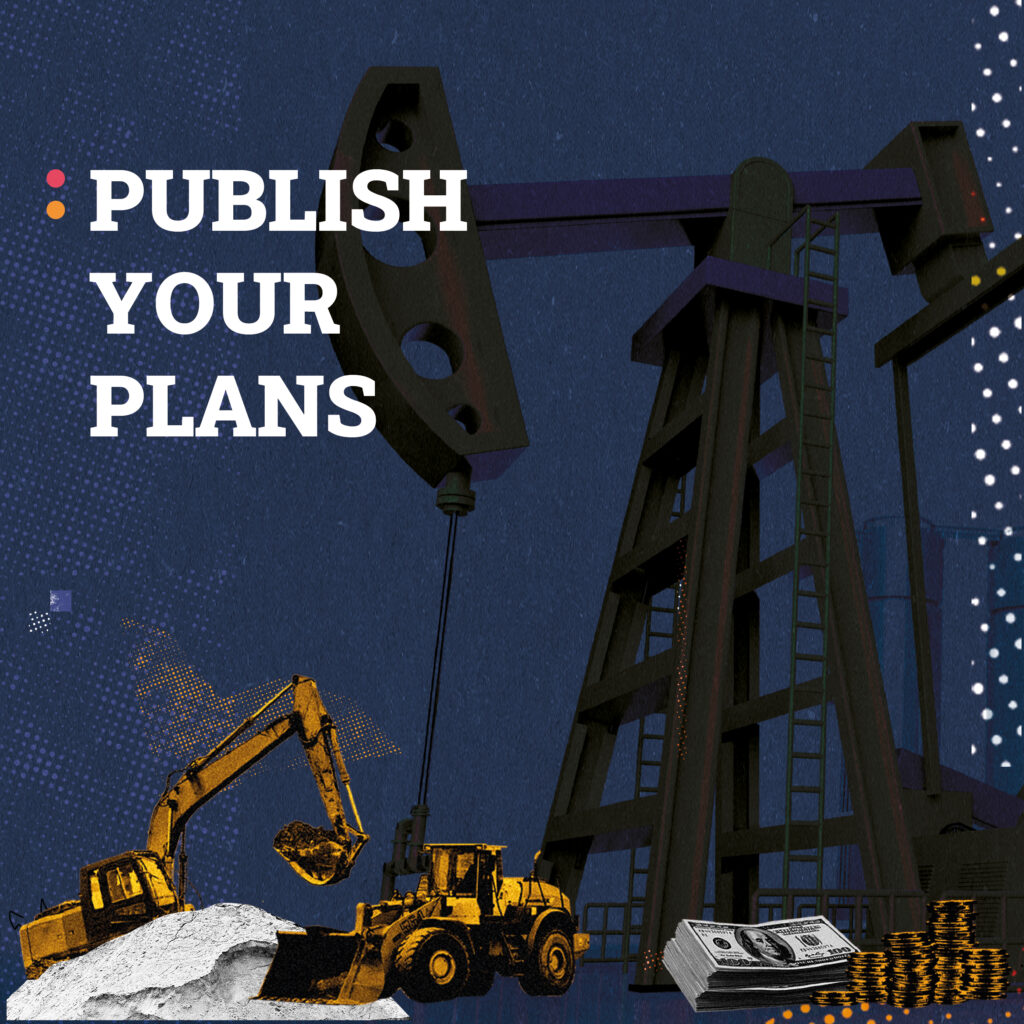
New handbook calls on fossil fuel companies to publish their energy transition plans
“Publish Your Plans” provides a guide for what oil and gas companies must disclose in their energy transition plans to effectively mitigate the climate damage of fossil fuels production and use. To date, not a single major fossil fuel company has published an adequate plan for a lower-carbon future.
June 27, 2023 (Washington, DC) – Today Publish What You Pay – United States (PWYP-US) published a first-of-its-kind handbook for fossil fuel companies to speed up the transition to lower-carbon energy and urgently phase out fossil fuels for a well-managed energy transition that protects the planet, fossil fuels-dependent communities, and investors.
The new handbook “Publish Your Plans: The Disclosures Needed to Support a Managed Decline of Oil and Gas Production and an Informed Energy Transition” identifies key categories of information that must be included in any energy transition plan for understanding, assessing, and managing climate and financial risk, including:
- Information on oil and gas reserves, including emissions embedded in reserves;
- Data about greenhouse gas emissions on a project-level basis;
- Critical financial assumptions and estimates underpinning financial reporting and accounting (including information on asset retirement obligations and impairment testing);
- Project break-even prices, or the commodity price at which a project is no longer profitable; and
- An analysis of price sensitivity for reserve valuations under different scenarios.
“To date not a single fossil fuel company has disclosed an energy transition plan that adequately addresses financial and environmental risks that their products pose. The world is moving toward cleaner, renewable energy. Yet fossil fuel companies continue to greenwash their operations by claiming to invest in lower carbon energy while not disclosing in a transparent manner the extent of these lower carbon investments, nor how they will phase out fossil fuel extraction and production,” said Carly Oboth, Director of Publish What You Pay – US.
“The most urgent task on planet earth is rapidly phasing out the use of fossil fuels. The oil and gas industry has done all that they can to prolong their business model, at the cost of a workable earth; we need concrete and clear plans for moving on. Now,” said Bill McKibben, Author, Educator, Environmentalist and founder of 350.org and ThirdAct.org.
With global heating increasing at a faster speed than anticipated and climate-related natural disasters becoming more extreme, the risks posed by continued fossil fuel extraction, production and use will not only have catastrophic effects for the environment, but also for financial markets and countries whose economies are dependent on fossil fuels.
The financial risk of lost profits associated with stranded oil and gas assets due to the energy transition is estimated to exceed US$1 trillion – with most of the losses owned by publicly-listed oil and gas companies. Further, such climate risk has significant implications for policymakers and citizens of fossil fuel-dependent countries, which, according to Carbon Tracker, could see a drop of 51 percent in government oil and gas revenues in a shift to a low-carbon economy in the next two decades. Despite these risks, no company transparently discloses how it will mitigate the financial risk of these stranded assets.
According to Carbon Tracker, the US market is particularly vulnerable to the issue of stranded assets. The US and Russia face the highest risks of physical stranding at roughly US$300 billion in assets each, followed by US$100 billion in assets at risk in both Canada and China.
Although some Western oil majors, including Shell, ENI, Equinor, and TotalEnergies, have begun to disclose some information about their plans to transition to net zero emissions, these plans are usually incomplete and do not capture the full lifespan of fossil fuel products. These plans downplay total emissions and do not disclose emissions that are incurred later down the line, known as Scope 3 emissions, which account for between 80 percent and 95 percent of the sector’s total emissions.
“I encourage policymakers – all of whom should be focused on how human society can survive the climate crisis and build a world that is more prosperous, secure, and clean – to read this handbook and to act. Nothing less than our collective future may depend on it,” said Simon Taylor, co-founder & Director, Global Witness and co-founder of the Publish What You Pay Campaign.
“The fossil fuel industry has been ignoring the negative impacts that oil and gas extraction has caused to the people and the planet especially the world’s poorest and most vulnerable communities. These companies must be held accountable through providing information to the people on their plans to support a just energy transition. The handbook will support our struggles as environmental activists to make our demands heard and acted upon,” said Evelyn Acham, Climate justice activist from Kampala, Uganda, founder of +1tree and co-Founder of Climate Justice for Healthy Communities.